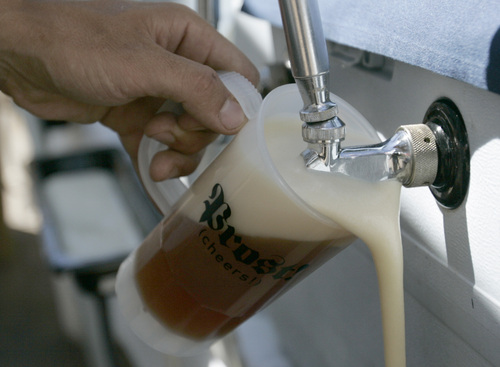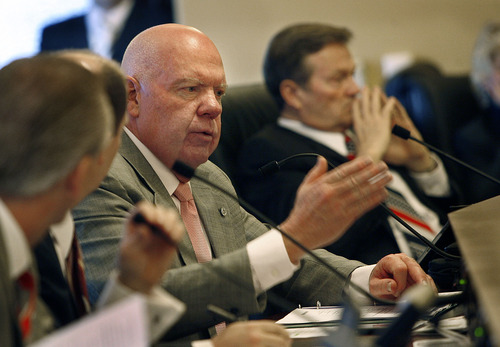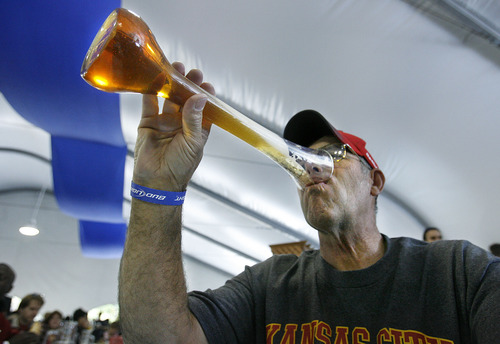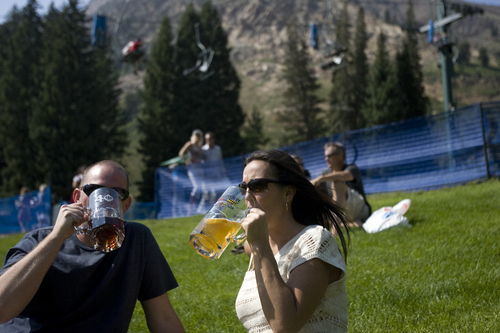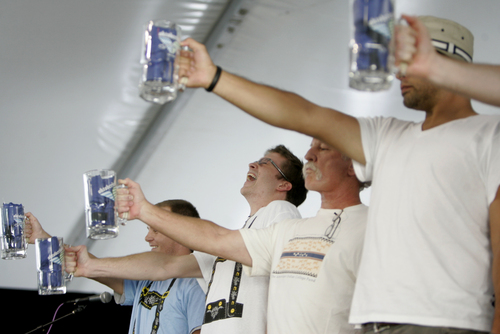This is an archived article that was published on sltrib.com in 2014, and information in the article may be outdated. It is provided only for personal research purposes and may not be reprinted.
After getting a stern lecture from some Utah lawmakers Monday, state officials will begin to rework the rules that apply to one-time liquor permits for community events and celebrations.
The decision means higher-alcohol beer, wine and spirits likely will flow at Snowbird Ski Resort's Oktoberfest this fall.
Last month, the state liquor commission sparked a frenzy after it told Snowbird officials that the resort might not receive a single-event permit for its annual German-style celebration.
The commission and staff at the Utah Department of Alcoholic Beverage Control (DABC) had started using a stricter interpretation of state law when granting the single-event permits — namely favoring a "civic or community group that promoted a common good" over a for-profit business that already had other state liquor licenses.
Under the new test, at least two businesses have been denied single-event permits: The Homestead Resort in Midway did not get a single-event permit for its crawfish boil over Memorial Day weekend; and the concessionaire for the Maverik Center in West Valley City failed to score single-event liquor permits that would have allowed wine and cocktails to be served at six Utah Grizzlies hockey games.
The situation is an example of how complicated Utah's liquor laws can be to interpret. Snowbird already holds 19 state liquor licenses for all its restaurants and bars. Those licenses, however, would allow only for beer that is 4 percent alcohol by weight (3.2 by volume) in the outdoor area where Oktoberfest is held. To serve higher-alcohol beer, wine or spirits, the resort needs a single-event permit.
The negative publicity surrounding Oktoberfest created enough heartburn among some Utah lawmakers that they added the issue to Monday's agenda of the Legislature's Administrative Rules Review Committee. Lawmakers were interested in talking to Sal Petilos, executive director of the DABC, about this new interpretation of Utah liquor laws.
Sen. Jim Dabakis said the talk about no beer at Oktoberfest "has made our state the laughingstock" of the country. He said he sees this and the "intent to dine" issue last year as a negative trend from the DABC and the liquor commission.
"I'm not sure they understand that what they do has serious implications," the Salt Lake City Democrat said.
In 2013, the DABC created an uproar in the dining and tourism industries when compliance officers cited several eateries for serving alcohol to diners as they perused menus or before they were seated at tables, saying it violated Utah's food-with-booze law. After complaints, Utah's liquor-control bosses backed off and decided to let restaurants police themselves.
Sen. Howard Stephenson, the committee co-chairman, also expressed annoyance at how the Oktoberfest publicity could affect Utah tourism.
"I don't blame you, as a director, for wanting to be in compliance with the law," the Draper Republican told Petilos and Commissioner John T. Nielsen. "But when you create a change, it creates media attention.
"The rules could have been changed by the commission," he added, "and you could have prevented this brouhaha."
After the admonishments, Nielsen told lawmakers that, starting Tuesday, he and the other six members of the commission will rework the rules, seeking input from businesses in the liquor industry as well as the public.
He said in the future, the nonprofit status "will be just one issue" the commission looks at when granting permits. "But it certainly will not be the overriding factor."
That means Snowbird, which submitted a single-event liquor application for Oktoberfest last Thursday, is likely to get approval, Nielsen said after the meeting.
"I anticipate that it will be approved at the commission's next meeting" on Tuesday, June 24, he said.
Snowbird officials were happy to hear the news.
"We appreciate the Legislature and DABC understanding the importance of this event and coming up with a timely solution," said Bob Bonar, general manager.


